- Home
- Yvonne Navarro
Highborn
Highborn Read online
“No ambulance,” Brynna said. “I don’t need one.”
She pushed Redmond’s hands away and turned toward the wall, trying for privacy, but Redmond circled around until he was facing her again.
“Don’t be stupid,” he said. “I don’t need you dying on me.”
“That’s ridiculous. I’m not going to die.”
“You’re shot,” he pointed out. “I can’t believe you’re still standing.”
Brynna realized there was no way he was going to leave her alone. Fine. Let him watch. She reached under her T-shirt and found the wound just below the ribs.
“Hey!” Redmond said in surprise. “Don’t do that! Just put pressure on.”
She ignored him and dug into the hole with her forefinger, hissing as fresh pain scissored through her muscles. The misshapen piece of offending metal came out with a fresh pulse of new blood. Brynna pressed her fist against it, warming the flesh until it heated and swelled, temporarily closing beneath her touch.
“No,” Redmond said. His voice sounded dull, almost mechanical. “You can’t have done what I think you just did.”
The sale of this book without its cover is unauthorized. If you purchased this book without a cover, you should be aware that it was reported to the publisher as “unsold and destroyed.” Neither the author nor the publisher has received payment for the sale of this “stripped book.”
Pocket Books
A Division of Simon & Schuster, Inc.
1230 Avenue of the Americas
New York, NY 10020
www.SimonandSchuster.com
This book is a work of fiction. Names, characters, places, and incidents either are products of the author’s imagination or are used fictitiously. Any resemblance to actual events or locales or persons, living or dead, is entirely coincidental.
Copyright © 2010 by Yvonne Navarro
All rights reserved, including the right to reproduce this book or portions thereof in any form whatsoever. For information address Pocket Books Subsidiary Rights Department, 1230 Avenue of the Americas, New York, NY 10020.
First Juno Books/Pocket Books paperback edition November 2010
JUNO BOOKS and colophon are trademarks of Wildside Press LLC used under license by Simon & Schuster, Inc., the publisher of this work.
POCKET and colophon are registered trademarks of Simon & Schuster, Inc.
For information about special discounts for bulk purchases, please contact Simon & Schuster Special Sales at 1-866-506-1949 or [email protected].
The Simon & Schuster Speakers Bureau can bring authors to your live event. For more information or to book an event contact the Simon & Schuster Speakers Bureau at 1-866-248-3049 or visit our website at www.simonspeakers.com.
Designed by Jacquelynne Hudson Cover design by Anna Dorfman Cover illustration by Craig White
Manufactured in the United States of America
10 9 8 7 6 5 4 3 2 1
ISBN 978-1-4391-9173-6
ISBN 978-1-4391-9174-3 (ebook)
For Wes
because of everything.
Acknowledgments
In no particular order, thank you to:
Weston Ochse
Martin Cochran
Don VanderSluis
Wayne Allen Sallee
Wayne Barlowe
Jerrett Cook
Scott Soukup
Laura Jiménez
Lucy Snyder
Tod Goldberg
Michael Whelan
Chris Golden
and
Mike Klesowitch, who is a real person but not the person in this book. He wanted me to use his name as long as he could be “anything but a soul-sucking baby-killer.” So now you know: There is no soul-sucking baby-killer.
Prologue
Most of the time, Astarte could smell the souls burning.
Accompanying the heavy fragrance, the tortured screams below her window endlessly swelled and receded, strung together like notes pried from a twisted violin and seething with the burned-sugar scent of agony.
There had been a time, early on, when she had enjoyed this, had relished the eternal punishment being hammered upon the spirits of those creatures she and her longtime lover considered no better than the rats that infested their earthly world. No, not rats; mice, tiny, insignificant rodents worthy only of being food for those beings not much better than themselves. The shrieks had been musical back then, filled with blood and retribution, but eventually Astarte found that she barely heard the sounds—they faded to the background like the constant buzzing of ever-present insects.
But now the soul cries had changed. They should have been as natural as the blood that constantly oozed from the cracks in the walls of her opulent rooms, nothing more unusual than the eternity of time one second took to pass to another. But no; lately the undulating waves of suffering had begun to eat at her, stinging her psyche like hungry, biting blowflies diving relentlessly at the wounds of a dying beast. Sometimes she would lash out and silence the ones within range, her rage and impatience incinerating them instantly and giving her a few moments—just that—of heavy, anticipatory silence.
Then, of course, the next shrieks would ripple across the plains as more souls were pushed forward to fill the void left by those she had temporarily destroyed. A hundred or a thousand seconds from now, the same souls she had just obliterated would be reborn into another cycle of their punishment and would be heard yet again. If she was lucky, their wails would fall upon the ears of another rather than herself, one who would grin rather than flinch at the sound.
But who in Hell was ever lucky?
She turned away from the sill and its vista of glowing scarlet rivers, a landscape that was dark but forever well lit. It was an arena filled with abominations that were always new and unspeakably dangerous, things that even now continued to surprise her when they crossed her royal path.
Everything in Hell watched everything else; it was a living thing, encompassing all, missing nothing, revealing everything to everyone. Even so, she neither knew nor cared who or what watched as her cracked and blackened fingertips lifted the only thing that remained of what she had once been.
A feather.
Its quill still glowed white, crystalline and pure—even the fires of Hell could not dim the light within its center. That the edges of the vane were singed and stained with sulfur and smoke took nothing away from the power it held over her. The pain she felt each time she held it was worse than anything a thousand demons could inflict, and the agony grew deeper and more overwhelming every time. The feather’s light was an aberration in this room, a single spot of perfection that was impossible to disguise or hide in this city of sheer obscenity; as if to prove that, the screams of the damned would swell to an unbearable cadence of want if she held it toward the unshuttered window. That the feather had not been ripped from her possession was a testament to the fact that even she, with all her vile, hallowed standing in this place, was not above being personally tormented. Nothing reminded an immortal being of its own eternity like an everlasting memento of that which could never again come to be.
Hell had taught her many things, not the least of which was how to wait. She had spent countless days, each like a century, with one elbow resting on her knees as she contemplated the feather, that glorious relic of the time before her fall from Grace. As the heat of Hell swirled inside and outside of her, she had to wonder—
Could she be redeemed?
It was said that nothing and no one could truly return from Hell, that time ceased to exist once those colossal black gates closed behind a weeping spirit. Any chance of salvation or forgiveness was left behind, as eternally unreachable as the Great Light of God Himself. But Lucifer was the King of Lies, and what better way to intensify
the punishment of those who were forever condemned than to take away the one thing that had always kept even that weakest of creations, mankind, going?
Hope.
She had it now, but only because she was allowed to, only because someday she would awaken to find the feather gone, spirited away as though it had never been. Then her symbol of hope would be gone, and what would be worse, she wondered: to have had it and lost it, or to have lost it and wonder if she had ever truly had it at all?
No, she had to get out of here before it truly was all gone. Not just the feather itself, but the hope, and the memories—before the last of those finally fled to leave her with nothing but a nameless, charred emptiness she no longer remembered how to satisfy.
One
A butterfly saved her.
Being what she was, she’d always been partial to anything with wings, and the fireball missed her only because she leaned sideways to look at the creature where it was balanced on the back of a park bench in Chicago’s Lincoln Park. Two inches wide at best, the butterfly was orange and yellow, plus a couple more colors that never registered because of the agony that suddenly ran up one arm and nearly spread to her neck and jawline.
A Hunter had already found her!
She dropped forward and rolled away from the next fireball, then scrambled around and behind the bench. A third fireball, small and white-hot, arced across the space in which she’d been standing only a second before, then disintegrated against a massive old tree. It made a sound like a fast-moving forest fire, then instantly burned out, leaving a smoking, circular scar on the tree’s thick trunk. On its heels was a scream from a woman who had come around the bend in the path just in time to see the miniature blast.
Good. Getting humans involved would put the balance on her side, give her a chance to escape while her pursuer was forced to hide. He wouldn’t kill her, but it was glaringly obvious he was going to have fun hurting her before he dragged her back.
Like she was ever going to let that happen.
It wasn’t difficult to lose herself in the trees off the path while the Hunter tried to follow without being seen. Once he made it into the trees, she could hear her attacker crashing after her, and all it took to leave him behind was stealth—he was overconfident and noisy; she was neither. She stayed close to the ground, almost on all fours, and moved as fast as she could, intentionally weaving in and out of the populated areas. In these she was barely more than a blur that made passersby frown and blink, and when she got to the edge of a body of water next to a sign that said SOUTH POND, she sucked in air and slipped into the warm mud- and leaf-choked liquid without hesitating. She didn’t breathe for a long, long time, swimming blindly away from the danger and coming up like an alligator at the water’s edge several hundred feet later, slow and cautious as only the top of her head and her eyes broke the surface.
She was safe.
For now.
SHE WASHED HER FACE and hands at a water fountain in the park, then pulled clean water through her hair until she felt reasonably presentable. Water was such an amazing thing—refreshing and clear, sweet against her skin despite the chemicals added by the city’s processing system. Although she hadn’t been able to stay and appreciate it, she’d even enjoyed the dirty, slightly polluted water in the pond.
Quickly moving west and away from the upscale lakefront area, she found some clothes hanging on a line in a small backyard. In this world of modern conveniences, she didn’t think people did that anymore—hang clothes out to dry—but perhaps this person wanted the smell of fresh air in the fabric. To her sensitive nose, Chicago’s exhaust-choked air wasn’t truly fresh, but people here were used to it.
Taking the simple T-shirt and denim jeans and the worn pair of athletic shoes she found by the back door was stealing, but she was out of options and that, surely, was not even a blip on the chart of her many crimes. Besides, walking around in rags stinking of pond water and streaked with dried mud wasn’t going to help her accomplish her task. The stolen jeans fit her tall frame surprisingly well, although the T-shirt was stretched snugly across her wide back and small breasts. The fabric was tight around her biceps, and every movement of her right arm sent a hot jolt down the flesh burned earlier. The side of her neck and face were deep pink from the heat spillover, but the pain was minor; her hair was singed and still smelled of fire. But she was quite used to that smell.
“That’s a pretty nasty burn on your arm.”
The voice came from her right and belonged to a nice-looking guy in his late thirties, who was a good four inches taller than her own six foot two. She was in Walgreens, a store like a twenty-first-century apothecary, staring at a shelf full of gauze and burn salve and thinking about the products on display. Her own physical pain was something she hadn’t had to contemplate in quite awhile. The last time she’d paid it any mind, human medicine had been little more than someone waving burning clumps of herbs over a wound and uttering a meaningless chant. Was there anything among the brightly colored boxes on these shelves that would actually soothe the monstrous stinging on her arm, or would it simply be a waste of time? Humans were certainly good at that. Because of what she was, a lot of things—how to dress, how to talk, even a culture’s customs and slang, just came to her automatically. But for this, she really had no idea, simply because she’d never needed such a thing. And in the meantime, here was this man.
No, not a man.
A nephilim.
A child fathered by an angel and born of a human mother.
She could smell him, in the way that only her kind could. It was an unmistakable thing, deep and alluring, as though he were surrounded by a mist of clean ocean water. The scent was so strong and so unexpected that all she could do for an overly long moment was breathe it in, pull it deep into her lungs and hold it there while she reveled in his nearness as his essence spread throughout her body.
A double heartbeat later, she exhaled. Without conscious thought, her tongue flicked over her lips, seeking the last trace.
He was looking at her expectantly. The burn—right. He’d said something about it. “Yeah,” she responded at last. Her voice was low and husky, a bit hoarse. She hadn’t actually spoken in centuries—it simply hadn’t been necessary—and she certainly hadn’t carried on a conversation with a human. Was there something else she should say about her injuries? What would this nephilim want to hear?
No, she reminded herself. Don’t think of him as nephilim, think of him as a man. After all, that’s all he knows that he is. Just a man.
The guy looked down at her arm again, then his gaze skimmed along the display. “This,” he said, pointing to a small blue-and-white box labeled BURN JEL. “If you’re not going to see a doctor, this is your best bet. Wash the entire area thoroughly every morning and evening, then spread this stuff on a piece of sterile gauze and scrub off the newly formed skin until all the dead skin is gone and the new is growing in evenly. It’s called debriding. It’ll be painful but it will help it heal and keep scarring to a minimum.”
She shrugged, then winced as the movement pulled the fabric of the shirt against her arm. “I don’t care about that,” she said. She wanted to keep him talking, but her people skills sucked. “It justxs … hurts.”
He nodded. “I’m sure it does, but there’s not much over the counter that’s going to help the pain. The ointment has a small amount of lidocaine in it, and you could take some aspirin along with that. You could also try one of the burn sprays, but I wouldn’t expect much out of it, not at that level.” He nodded at her arm, then fell silent for a moment. “You know,” he added finally, “that’s a fresh second-degree burn. I can’t believe you’re not going to see a doctor.”
She managed a small, strained smile. The pain made that easy, even if normal conversation was a challenge. “I thought you were one.”
He looked momentarily surprised, then shook his head. “Me? No, I’m an EMT.”
She squinted at him. “What does that stand for?”
/>
“Emergency medical technician. I drive an ambulance.”
“Next best thing.”
“To a doctor?” He shook his head again, this time more emphatically. “Not at all.”
“Well,” she said. She hesitated, finally stepping back from the shelf. She’d run out of creativity and couldn’t think of anything else to talk about. “Thanks for the advice.”
His eyes widened. “Wait—aren’t you going to pick up some supplies?”
“Maybe later.”
“Ah.” He frowned at her, then his expression smoothed. She realized instantly that he knew she had no money. As much as he dealt with people, he was probably an expert at reading situations. “I’m Toby. What’s your name?”
Name? Of course—she should have one of those, yet she hadn’t given it a moment’s thought. Giving her real name was unthinkable, but what should she call herself? Twice before she had been formally named, and she had used thousands of others through the millennia; for the first time, now she could choose her own. A million alternatives flashed through her brain, letters and languages with little rhyme or reason, still others with hidden purpose—
“Brynna,” she blurted.
All right. That would do.
“Very nice,” he said, but it was clear he was thinking about anything but that as his hand dug in his back pocket and brought out a worn leather wallet. “Listen, Brynna. I think you could use a little hel—”
The left side of his head caved in.
There wasn’t much sound with it, just a sort of thump and a crystalline tinkling that seemed to come afterward, almost as an addendum to the actual event. One moment Brynna was gazing at Toby, whose expression was sincere and vaguely like that of an eager-to-please child as he prepared to offer her money; in the next, she was blinking at a misshapen red hole easily two inches around. It was a huge and ugly thing that gouted blood down his shoulder; even more hideous was the way the right side of his skull had suddenly bulged outward, like someone had forced air into a balloon then let only part of it out. Toby’s knees buckled and he turned and fell in front of her, leaving a pattern of bloody mist and vaporized skin in his wake. He went down as quickly and gracelessly as a dropped wooden puppet.

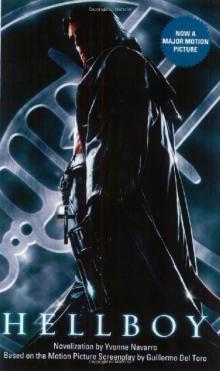 Hellboy
Hellboy Concrete Savior
Concrete Savior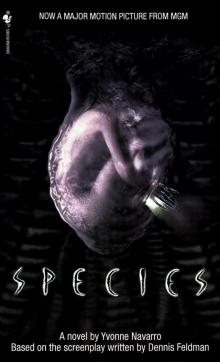 Species
Species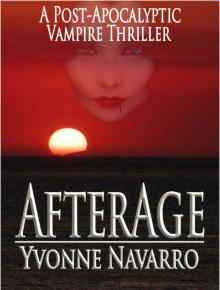 AfterAge
AfterAge Ultraviolet
Ultraviolet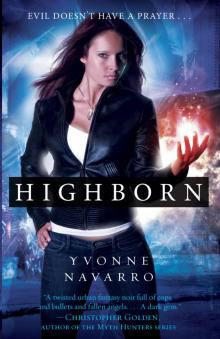 Highborn
Highborn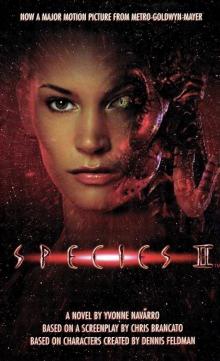 Species II
Species II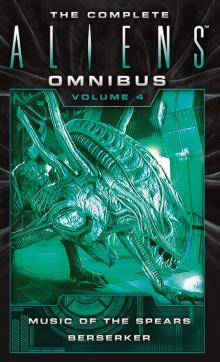 Aliens Omnibus 4
Aliens Omnibus 4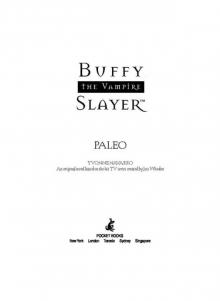 Paleo
Paleo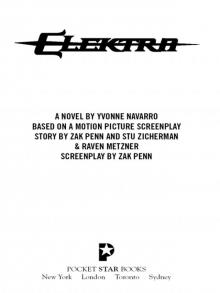 Elektra
Elektra